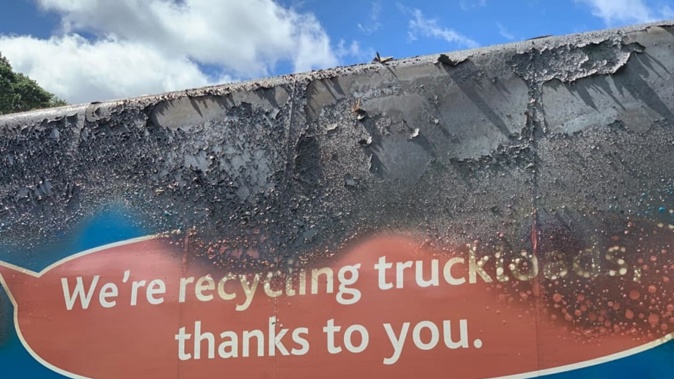
Rubbish truck fires caused by batteries are costing Auckland ratepayers tens of thousands of dollars a year, and the problem is getting worse.
Auckland has already had at least 13 rubbish truck fires this year, following 20 fires last year – almost double the number recorded in 2023.
Council data – released to Newstalk ZB under the Local Government Official Information Act – shows each fire costs the council between $2000 and $5000.
Recycling facility fires are costing the council a further $48,000 a year.
 An Auckland Council recycling truck was forced to dump its load of rubbish after it caught fire in Mt Roskil in February last year. Photo / Hayden Woodward
An Auckland Council recycling truck was forced to dump its load of rubbish after it caught fire in Mt Roskil in February last year. Photo / Hayden Woodward
The most recent audit of Auckland’s kerbside refuse bins in 2023 revealed 71% of bins contain electronic waste.
Auckland Council recorded about 6000 hazardous waste items being removed each year from the sorting line at its material recovery facility, including around 300 LPG gas bottles, 2000 12V batteries and 3000 laptops.
Christchurch, Wellington, Hamilton and Tauranga councils have all noted a similar rise in e-waste being disposed of incorrectly.
According to the Global E-waste Monitor Report released by Unitar (the United Nations Institute for Training and Research) about 80 million kilograms of e-waste are produced in New Zealand annually, with less than 1% being sent for recycling and the remainder going into landfills.
 This truck caught fire in Melville in February after a vape battery was wrongly put in a recycling bin. Photo / Hamilton City Council
This truck caught fire in Melville in February after a vape battery was wrongly put in a recycling bin. Photo / Hamilton City Council
Auckland Council general manager waste solutions Justine Haves said more and more batteries are ending up in rubbish bins.
“There’s so much more batteries and devices of all types that don’t actually have a long shelf life.”
Haves said there are significant health and safety concerns for the driver and anyone nearby due to the toxic smoke.
“It’s a big issue in Auckland but also we understand nationally and internationally.”
She said the council completed a review with multiple agencies to better understand what’s causing the fires and what could be done to be prevent them.
 The Government has announced more funding for electronic waste depots and recycling campaigns. Photo / Thinkstock
The Government has announced more funding for electronic waste depots and recycling campaigns. Photo / Thinkstock
Recycling advocates are calling on the Government to do more.
Patrick Moynahan – the chief executive of electronic waste recycling company Echo Technology said there’s a massive lack of legislation which leads to confusion around how batteries should be disposed of.
He said they can extract valuable metals including gold, silver, platinum and copper.
“We have a huge mountain to climb to figure out what the regulatory requirements are, what the infrastructure requirements are.”
 Computer boards awaiting to be dismantled as recyclable waste at the Electronic Recyclers International plant in Holliston, Massachusetts, USA.
Computer boards awaiting to be dismantled as recyclable waste at the Electronic Recyclers International plant in Holliston, Massachusetts, USA.
WasteMinz chief executive Nic Quilty said it’s been writing to multiple Government departments and ministers about the issue.
“It is urgent. Sooner or later someone’s life will be lost.”
Quilty said there are currently no obligations for battery manufacturers, battery importers and businesses selling batteries or products containing batteries to deal with the waste.
Minister for the Environment Penny Simmonds. Photo / Mark Mitchell
Environment Minister Penny Simmonds said the Government’s working on an e-waste product stewardship scheme.
She said in June 2023, TechCollect NZ published recommendations for New Zealand’s e-product stewardship scheme.
“The Ministry for the Environment is working with industry and stakeholders on the next steps.”
Simmonds said TechCollect NZ advised that further work was needed to finalise the scheme design.
Lachlan Rennie is an Auckland-based journalist covering science, technology, community issues and general news. He previously studied journalism at the New Zealand Broadcasting School before joining NZME in 2024.
Take your Radio, Podcasts and Music with you









